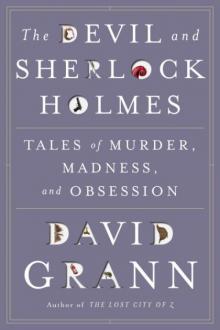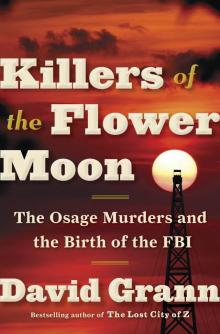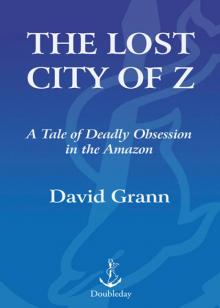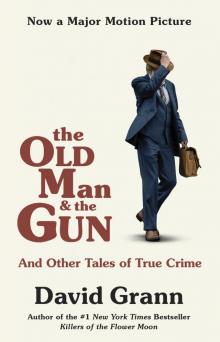- Home
- David Grann
The Old Man and the Gun Page 10
The Old Man and the Gun Read online
Page 10
* * *
—
In custody, Bourdin told a story that seemed as fanciful as his tale of being Nicholas Barclay. He alleged that Beverly and Jason may have been complicit in Nicholas’s disappearance, and that they had known from the outset that Bourdin was lying. “I’m a good impostor, but I’m not that good,” Bourdin told me.
Of course, the authorities could not rely on the account of a known pathological liar. “He tells ninety-nine lies and maybe the one hundredth is the truth, but you don’t know,” Fisher says. Yet the authorities had their own suspicions. Jack Stick, who was a federal prosecutor at the time and who later served a term in the Texas House of Representatives, was assigned Bourdin’s case. He and Fisher wondered why Beverly had resisted attempts by the F.B.I. to investigate Bourdin’s purported kidnapping and, later, to uncover his deception. They also questioned why she had not taken Bourdin back to live with her. According to Fisher, Carey told her that it was because it was “too upsetting” for Beverly, which, at least to Fisher and Stick, seemed strange. “You’d be so happy to have your child back,” Fisher says. It was “another red flag.”
Fisher and Stick took note of the disturbances in Beverly’s house after Nicholas had vanished, and the police report stating that Beverly was screaming at Jason over Nicholas’s disappearance. Then there was Jason’s claim that he had witnessed Nicholas breaking into the house. No evidence could be found to back up this startling story, and Jason had made the claim at the time that the police had started “sniffing around,” as Stick put it. He and Fisher suspected that the story was a ruse meant to reinforce the idea that Nicholas was a runaway.
Stick and Fisher began to edge toward a homicide investigation. “I wanted to know what had happened to that little kid,” Stick recalls.
Stick and Fisher gathered more evidence suggesting that Beverly’s home was prone to violence. They say that officials at Nicholas’s school had expressed concern that Nicholas might be an abused child, owing to bruises on his body, and that just before he disappeared the officials had alerted child-protective services. And neighbors noted that Nicholas had sometimes hit Beverly.
One day, Fisher asked Beverly to take a polygraph. Carey recalls, “I said, ‘Mom, do whatever they ask you to do. Go take the lie-detector test. You didn’t kill Nicholas.’ So she did.”
While Beverly was taking the polygraph, Fisher watched the proceedings on a video monitor in a nearby room. The most important question was whether Beverly currently knew the whereabouts of Nicholas. She said no, twice. The polygraph examiner told Fisher that Beverly had seemingly answered truthfully. When Fisher expressed disbelief, the examiner said that if Beverly was lying, she had to be on drugs. After a while, the examiner administered the test again, at which point the effects of any possible narcotics, including methadone, might have worn off. This time, when the examiner asked if Beverly knew Nicholas’s whereabouts, Fisher says, the machine went wild, indicating a lie. “She blew the instruments practically off the table,” Fisher says. (False positives are not uncommon in polygraphs, and scientists dispute their basic reliability.)
According to Fisher, when the examiner told Beverly that she had failed the exam, and began pressing her with more questions, Beverly yelled, “I don’t have to put up with this,” then got up and ran out the door. “I catch her,” Fisher recalls. “I say, ‘Why are you running?’ She is furious. She says, ‘This is so typical of Nicholas. Look at the hell he’s putting me through.’ ”
Fisher next wanted to interview Jason, but he resisted. When he finally agreed to meet her, several weeks after Bourdin had been arrested, Fisher says, she had to “pull words out of him.” They spoke about the fact that he had not gone to see his alleged brother for nearly two months: “I said, ‘Here’s your brother, long gone, kidnapped, and aren’t you eager to see him?’ He said, ‘Well, no.’ I said, ‘Did he look like your brother to you?’ ‘Well, I guess.’ ” Fisher found his responses grudging, and developed a “very strong suspicion that Jason had participated in the disappearance of his brother.” Stick, too, believed that Jason either had been “involved in Nicholas’s disappearance or had information that could tell us what had happened.” Fisher even suspected that Beverly knew what had happened to Nicholas, and may have helped cover up the crime in order to protect Jason.
After the interview, Stick and Fisher say, Jason refused to speak to the authorities again without a lawyer or unless he was under arrest. But Parker, who as a private investigator was not bound by the same legal restrictions as Stick and Fisher, continued to press Jason. On one occasion, he accused him of murder. “I think you did it,” Parker says he told him. “I don’t think you meant to do it, but you did.” In response, Parker says, “He just looked at me.”
Several weeks after Fisher and Parker questioned Jason, Parker was driving through downtown San Antonio and saw Beverly on the sidewalk. He asked her if she wanted a ride. When she got in, she told him that Jason had died of an overdose of cocaine. Parker, who knew that Jason had been off drugs for more than a year, says that he asked if she thought he had taken his life on purpose. She said, “I don’t know.” Stick, Fisher, and Parker suspect that it was a suicide.
* * *
—
Since the loss of her sons, Beverly has stopped using drugs and moved out to Spring Branch, where she lives in a trailer, helping a woman care for her severely handicapped daughter. She agreed to talk with me about the authorities’ suspicions. At first, Beverly said that I could drive out to meet her, but later she told me that the woman she worked for did not want visitors, so we spoke by phone. One of her vocal cords had recently become paralyzed, deepening her already low and gravelly voice. Parker, who had frequently chatted with her at the doughnut shop, had told me, “I don’t know why I liked her, but I did. She had this thousand-yard stare. She looked like someone whose life had taken everything out of her.”
Beverly answered my questions forthrightly. At the airport, she said, she had hung back because Bourdin “looked odd.” She added, “If I went with my gut, I would have known right away.” She admitted that she had taken drugs—“probably” heroin, methadone, and alcohol—before the polygraph exam. “When they accused me, I freaked out,” she said. “I worked my ass off to raise my kids. Why would I do something to my kids?” She continued, “I’m not a violent person. They didn’t talk to any of my friends or associates….It was just a shot in the dark, to see if I’d admit something.” She also said of herself, “I’m the world’s worst liar. I can’t lie worth crap.”
I asked her if Jason had hurt Nicholas. She paused for a moment, then said that she didn’t think so. She acknowledged that when Jason did cocaine he became “totally wacko—a completely different person—and it was scary.” He even beat up his father once, she said. But she noted that Jason had not been a serious addict until after Nicholas disappeared. She agreed with the authorities on one point: she placed little credence in Jason’s reported sighting of Nicholas after he disappeared. “Jason was having problems at that time,” she said. “I just don’t believe Nicholas came there.”
As we spoke, I asked several times how she could have believed for nearly five months that a twenty-three-year-old Frenchman with dyed hair, brown eyes, and a European accent was her son. “We just kept making excuses—that he’s different because of all this ugly stuff that had happened,” she said. She and Carey wanted it to be him so badly. It was only after he came to live with her that she had doubts. “He just didn’t act like my son,” Beverly said. “I couldn’t bond with him. I just didn’t have that feeling. My heart went out for him, but not like a mother’s would. The kid’s a mess and it’s sad, and I wouldn’t wish that on anybody.”
Beverly’s experience, as incredible as it is, does have a precursor—an incident that has been described as one of “the strangest cases in the annals of police history.” (It is the basis of a Clint Ea
stwood movie, “Changeling.”) On March 10, 1928, a nine-year-old boy named Walter Collins disappeared in Los Angeles. Six months later, after a nationwide manhunt, a boy showed up claiming that he was Walter and insisting that he had been kidnapped. The police were certain that he was Walter, and a family friend testified that “things the boy said and did would convince anybody” that he was the missing child. When Walter’s mother, Christine, went to retrieve her son, however, she did not think it was him. Although the authorities and friends persuaded her to take him home, she brought the boy back to a police station after a few days, insisting, “This is not my son.” She later testified, “His teeth were different, his voice was different….His ears were smaller.” The authorities thought that she must be suffering emotional distress from her son’s disappearance, and had her institutionalized in a psychiatric ward. Even then, she refused to budge. As she told a police captain, “One thing a mother ought to know was the identity of her child.” Eight days later, she was released. Evidence soon emerged that her son was likely murdered by a serial killer, and the boy claiming to be her son confessed that he was an eleven-year-old runaway from Iowa who, in his words, thought that it was “fun to be somebody you aren’t.”
Speaking of the Bourdin case, Fisher said that one thing was certain: “Beverly had to know that wasn’t her son.”
After several months of investigation, Stick determined that there was no evidence to charge anyone with Nicholas’s disappearance. There were no witnesses, no DNA. The authorities could not even say whether Nicholas was dead. Stick concluded that Jason’s overdose had all but “precluded the possibility” that the authorities could determine what had happened to Nicholas.
On September 9, 1998, Frédéric Bourdin stood in a San Antonio courtroom and pleaded guilty to perjury, and to obtaining and possessing false documents. This time, his claim that he was merely seeking love elicited outrage. Carey, who had a nervous breakdown after Bourdin was arrested, testified before his sentencing, saying, “He has lied, and lied, and lied again. And to this day he continues to lie. He bears no remorse.” Stick denounced Bourdin as a “flesh-eating bacteria,” and the judge compared what Bourdin had done—giving a family the hope that their lost child was alive and then shattering it—to murder.
The only person who seemed to have any sympathy for Bourdin was Beverly. She said at the time, “I feel sorry for him. You know, we got to know him, and this kid has been through hell. He has a lot of nervous habits.” She told me, “He did a lot of things that took a lot of guts, if you think about it.”
The judge sentenced Bourdin to six years—more than three times what was recommended under the sentencing guidelines. Bourdin told the courtroom, “I apologize to all the people in my past, for what I have done. I wish, I wish that you believe me, but I know it’s impossible.” Whether he was in jail or not, he added, “I am a prisoner of myself.”
* * *
—
When I last saw Bourdin, in the spring of 2008, his life had undergone perhaps its most dramatic transformation. He had married a Frenchwoman, Isabelle, whom he had met two years earlier. In her late twenties, Isabelle was slim and pretty and soft-spoken. She was studying to be a lawyer. A victim of family abuse, she had seen Bourdin on television, describing his own abuse and his quest for love, and she had been so moved that she eventually tracked him down. “I told him what interests me in his life wasn’t the way he bent the truth but why he did that and the things that he looked for,” she said.
Bourdin says that when Isabelle first approached him he thought it must be a joke, but they met in Paris and gradually fell in love. He said that he had never been in a relationship before. “I’ve always been a wall,” he said. “A cold wall.” On August 8, 2007, after a year of courtship, they got married at the town hall of a village outside Pau.
Bourdin’s mother says that Frédéric invited her and his grandfather to the ceremony, but they didn’t go. “No one believed him,” she says.
When I saw Isabelle, she was nearly eight months pregnant. Hoping to avoid public attention, she and Frédéric had relocated to Le Mans, and they had moved into a small one-bedroom apartment in an old stone building with wood floors and a window that overlooked a prison. “It reminds me of where I’ve been,” Bourdin said. A box containing the pieces of a crib lay on the floor of the sparsely decorated living room. Bourdin’s hair was now cropped, and he was dressed without flamboyance, in jeans and a sweatshirt. He told me that he had got a job in telemarketing. Given his skills at persuasion, he was unusually good at it. “Let’s just say I’m a natural,” he said.
Most of his family believes that all these changes are merely part of another role, one that will end disastrously for his wife and baby. “You can’t just invent yourself as a father,” his uncle Jean-Luc Drouart said. “You’re not a dad for six days or six months. It is not a character—it is a reality.” He added, “I fear for that child.”
Bourdin’s mother, Ghislaine, says that her son is a “liar and will never change.”
After so many years of playing an impostor, Bourdin has left his family and many authorities with the conviction that this is who Frédéric Pierre Bourdin really is: he is a chameleon. Within months of being released from prison in the United States and deported to France, in October, 2003, Bourdin resumed playing a child. He even stole the identity of a fourteen-year-old missing French boy named Léo Balley, who had vanished almost eight years earlier, on a camping trip. This time, police did a DNA test that quickly revealed that Bourdin was lying. A psychiatrist who evaluated him concluded, “The prognosis seems more than worrying….We are very pessimistic about modifying these personality traits.” (Bourdin, while in prison in America, began reading psychology texts, and jotted down in his journal the following passage: “When confronted with his misconduct the psychopath has enough false sincerity and apparent remorse that he renews hope and trust among his accusers. However, after several repetitions, his convincing show is finally recognized for what it is—a show.”)
Isabelle is sure that Bourdin “can change.” She said, “I’ve seen him now for two years, and he is not that person.”
At one point, Bourdin touched Isabelle’s stomach. “My baby can have three arms and three legs,” he said. “It doesn’t matter. I don’t need my child to be perfect. All I want is that this child feels love.” He did not care what his family thought. “They are my shelter,” he said of his wife and soon-to-be child. “No one can take that from me.”
A month later, Bourdin called and told me that his wife had given birth. “It’s a girl,” he said. He and Isabelle had named her Athena, for the Greek goddess. “I’m really a father,” he said.
I asked if he had become a new person. For a moment, he fell silent. Then he said, “No, this is who I am.”
—August, 2008
What’s next on
your reading list?
Discover your next
great read!
* * *
Get personalized book picks and up-to-date news about this author.
Sign up now.

 The Devil & Sherlock Holmes: Tales of Murder, Madness & Obsession
The Devil & Sherlock Holmes: Tales of Murder, Madness & Obsession Killers of the Flower Moon
Killers of the Flower Moon The Lost City of Z
The Lost City of Z The Old Man and the Gun
The Old Man and the Gun